The vivacity and joyousness of Chaucer's poetic temperament, however, show themselves in various other ways besides his favourite manner of treating a favourite theme. They enhance the spirit of his passages of dialogue, and add force and freshness to his passages of description. They make him amusingly impatient of epical lengths, abrupt in his transitions, and anxious, with an anxiety usually manifested by readers rather than by writers, to come to the point, "to the great effect," as he is wont to call it. "Men," he says, "may overlade a ship or barge, and therefore Iwill skip at once to the effect, and let all the rest slip." And he unconsciously suggests a striking difference between himself and the great Elizabethan epic poet who owes so much to him, when he declines to make as long a tale of the chaff or of the straw as of the corn, and to describe all the details of a marriage-feast seriatim:
The fruit of every tale is for to say:
They eat and drink, and dance and sing and play.
This may be the fruit; but epic poets, from Homer downwards, have been generally in the habit of not neglecting the foliage. Spenser in particular has that impartial copiousness which we think it our duty to admire in the Ionic epos, but which, if the truth were told, has prevented generations of Englishmen from acquiring an intimate personal acquaintance with the "Fairy Queen." With Chaucer the danger certainly rather lay in an opposite direction. Most assuredly he can tell a story with admirable point and precision, when he wishes to do so. Perhaps no better example of his skill in this respect could be cited than the "Manciple's Tale,"with its rapid narrative, its major and minor catastrophe, and its concise moral ending thus:--My son, beware, and be no author new Of tidings, whether they be false or true;Whereso thou comest, among high or low, Keep well thy tongue, and think upon the crow.
At the same time, his frequently recurring announcements of his desire to be brief have the effect of ****** his narrative appear to halt, and thus unfortunately defeat their own purpose. An example of this may be found in the "Knight's Tale," a narrative poem of which, in contrast with its beauties, a want of evenness is one of the chief defects. It is not that the desire to suppress redundancies is a tendency deserving anything but commendation in any writer, whether great or small; but rather, that the art of concealing art had not yet dawned upon Chaucer. And yet, few writers of any time have taken a more evident pleasure in the process of literary production, and have more visibly overflowed with sympathy for, or antipathy against, the characters of their own creation. Great novelists of our own age have often told their readers, in prefaces to their fictions or in quasi-confidential comments upon them, of the intimacy in which they have lived with the offspring of their own brain, to them far from shadowy beings. But only the *****te of Chaucer's literary age, together with the vivacity of his manner of thought and writing, could place him in so close a personal relation towards the personages and the incidents of his poems. He is overcome by "pity and ruth" as he reads of suffering, and his eyes "wax foul and sore" as he prepares to tell of its infliction. He compassionates "love's servants"as if he were their own "brother dear;" and into his adaptation of the eventful story of Constance (the "Man of Law's Tale") he introduces apostrophe upon apostrophe, to the defenceless condition of his heroine--to her relentless enemy the Sultana, and to Satan, who ever makes his instrument of women "when he will beguile"--to the drunken messenger who allowed the letter carried by him to be stolen from him,--and to the treacherous Queen-mother who caused them to be stolen. Indeed, in addressing the last-named personage, the poet seems to lose all control over himself.
O Domegild, I have no English digne Unto thy malice and thy tyranny:
And therefore to the fiend I thee resign, Let him at length tell of thy treachery.
Fye, mannish, fye!--Oh nay, by God, I lie;
Fye fiendish spirit, for I dare well tell, Though thou here walk, thy spirit is in hell.
At the opening of the "Legend of Ariadne" he bids Minos redden with shame;and towards its close, when narrating how Theseus sailed away, leaving his true-love behind, he expresses a hope that the wind may drive the traitor "a twenty devil way." Nor does this vivacity find a less amusing expression in so trifling a touch as that in the "Clerk's Tale," where the domestic sent to deprive Griseldis of her boy becomes, eo ipso as it were, "this ugly sergeant."Closely allied to Chaucer's liveliness and gaiety of disposition, and in part springing from them, are his keen sense of the ridiculous and the power of satire which he has at his command. His humour has many varieties, ranging from the refined and half-melancholy irony of the "House of Fame" to the ready wit of the sagacious uncle of Cressid, the burlesque fun of the inimitable "Nun's Priest's Tale," and the very gross salt of the "Reeve," the "Miller," and one or two others. The springs of humour often capriciously refuse to allow themselves to be discovered; nor is the satire of which the direct intention is transparent invariably the most effective species of satire. Concerning, however, Chaucer's use of the power which he in so large a measure possessed, viz. that of covering with ridicule the palpable vices or weaknesses of the classes or kinds of men represented by some of his character-types, one assertion may be made with tolerable safety. Whatever may have been the first stimulus and the ultimate scope of the wit and humour which he here expended, they are NOTto be explained as moral indignation in disguise. And in truth Chaucer's merriment flows spontaneously from a source very near the surface; he is so extremely diverting, because he is so extremely diverted himself.














